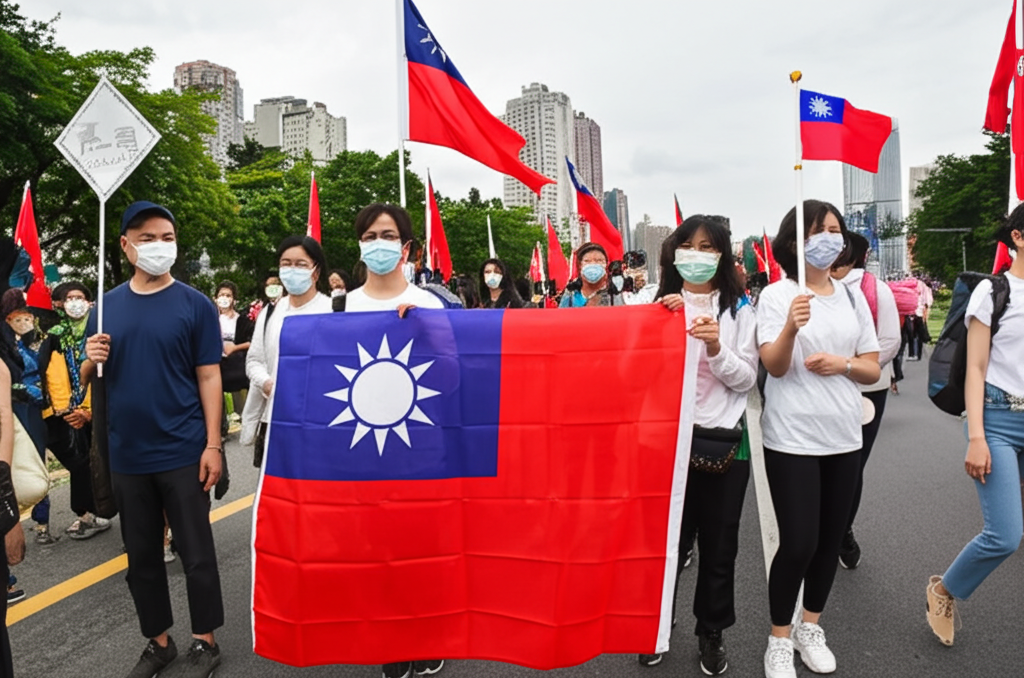Taiwan Protests: Concerns Rise Over Hong Kong's Article 23 and Cross-Strait Peace
Demonstrators in Taipei voice fears about Beijing's intentions and the implications of Article 23.

In Taipei, Taiwan, protestors gathered to commemorate the anniversary of the implementation of Article 23 of the Hong Kong Basic Law, expressing strong reservations about the cross-strait peace advocated by Beijing, viewing it as a strategy for annexation.
The demonstration served as a platform to condemn the Hong Kong government's actions against Hong Kongers who have migrated abroad. A street theater performance featured a person dressed as Winnie the Pooh—a reference to Chinese President Xi Jinping (習近平)—distributing red balloons filled with "sugar-coated lies," which were then "exposed" by Hong Kongers, Tibetans, and Uighurs.
Artists at the protest created imagery of the “Hong Kong 47” democracy campaigners, charged with conspiracy to commit subversion under Hong Kong’s National Security Law, with 45 of them having been jailed. They also depicted Apple Daily founder Jimmy Lai (黎智英), accused of colluding with foreign forces, and Chow Hang-tung (鄒幸彤), imprisoned for commemorating victims of the 1989 Tiananmen Square Massacre.
Hong Kong Outlanders chairman Sky Fung (馮紹天) highlighted that Article 23 was initially blocked in 2003 due to protests by 500,000 Hong Kongers, who opposed the legislation that would allow the prohibition of acts of treason, secession, sedition, or subversion against the Chinese government.
However, freedoms in Hong Kong have been significantly curtailed since the implementation of the Beijing-imposed National Security Law in 2020. Fung noted that the reintroduction and passage of Article 23 by the Hong Kong government in March of the previous year has been used to suppress freedoms.
Taiwanese human rights advocate Lee Ming-che (李明哲), who was detained by Chinese authorities and released in April 2022, stated that Hong Kongers were unable to reject Article 23 last year due to the National Security Law. Lee Ming-che explained that Hong Kong Chief Executive John Lee (李家超) made "inciting subversion of state power" a crime, which has led to the dissolution of numerous pro-democracy political parties and organizations.
Under Article 23, failure to report suspicious activity can result in a sentence of up to 14 years in prison. Lee Ming-che added that the Hong Kong government can leverage the law to interrogate the families of Hong Kongers who have sought refuge in other countries. A person could be imprisoned simply for wearing a T-shirt featuring the “Revolution of Our Times” (時代革命) slogan, used during democracy protests in Hong Kong in 2019 and 2020. He further elaborated that the Hong Kong police have the power to arbitrarily arrest individuals if they suspect criminal intent.
"In Taiwan, we are used to democracy and the freedom to criticize the government. Anyone who wants to travel to Hong Kong should think twice, because every move you take for granted here might be considered a crime," Lee Ming-che said.
He added that the ultimate authority to interpret Article 23 resides with the Standing Committee of the National People’s Congress of the People’s Republic of China, not the Hong Kong courts. "Anyone in Taiwan who wants to sign a peace treaty with China might want to look at what has transpired in Hong Kong first," he advised.
Lee Ming-che noted that while Beijing aims to integrate Hong Kong into its socioeconomic system, aiming to showcase "one country, two systems," Hong Kong's economy has deteriorated. This has led to a 53% increase in Hong Kongers’ consumption in Shenzhen, China, and the migration of 300,000 Hong Kongers to other countries in recent years.
Other Versions
Protestas en Taiwán: Aumenta la preocupación por el artículo 23 de Hong Kong y la paz a través del Estrecho
Manifestations à Taiwan : L'article 23 de Hong Kong et la paix entre les deux rives du détroit suscitent des inquiétudes
Protes di Taiwan: Kekhawatiran Meningkat Terkait Pasal 23 Hong Kong dan Perdamaian Lintas Selat
Proteste a Taiwan: Aumentano le preoccupazioni per l'articolo 23 di Hong Kong e la pace nello Stretto
台湾デモ:香港の23条と海峡両岸の平和をめぐり高まる懸念
대만 시위: 홍콩의 제23조와 양안 평화에 대한 우려의 목소리가 커지고 있습니다.
Mga Protestsa sa Taiwan: Pag-aalala Sumisigla Tungkol sa Artikulo 23 ng Hong Kong at Kapayapaan sa Tawiran
Протесты на Тайване: Возрастает озабоченность по поводу 23-й статьи Гонконга и мира между двумя берегами
การประท้วงในไต้หวัน: ความกังวลเพิ่มขึ้นเกี่ยวกับมาตรา 23 ของฮ่องกงและสันติภาพข้ามช่องแคบ
Biểu tình ở Đài Loan: Lo ngại dâng cao về Điều 23 của Hồng Kông và hòa bình xuyên eo biển

